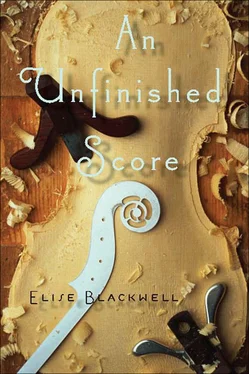The page is trembling when Petra startles her from behind, her breath in her ear. “What do you have there?”
“I think I’m holding the score to a viola concerto,” she says because there is no other answer. “I’ve never seen it before.”
Petra plucks the sheet from her hand and takes it to the piano. Standing in the kitchen with her eyes closed, Suzanne hears Petra play the agitated opening theme.
In the four weeks since Alex’s death, Suzanne has survived minute to minute, breath by breath, muting herself, fleeing to the past as often and as fully as she can, hiding in the shallowest present she can make, as numb as she can will herself to be.
Now, on the one-month anniversary of the plane crash that killed her lover, as she listens to Petra play the horribly beautiful music, feeling returns to Suzanne like the excruciating tingle of blood circulating in a limb that has fallen asleep. Pain .
She must have watched Suzanne come up the walk, because Olivia opens the door even as she knocks. Usually Alex called her my wife , or simply, with the power of an incantation, she . As in: She just pulled up; I have to go . Or: I can’t get out tonight to call; I think she is suspicious . Or, some days: She is making me angry enough to leave her; do you think the quartet would consider relocating?
Still, Olivia’s is a name Suzanne has heard often enough, and yet she is unprepared for the woman. She is unprepared for the elegant lines of her face or the way her straight posture, combined with her height, makes her regal. A Greek rendering of a goddess, an Athena, stepping past middle age with grace. Her hair is not graying or salt-and-pepper — the words Alex casually tossed — but gloriously silver and black, sleek, coiled into a smooth chignon at the nape of her long neck. Alex did not warn Suzanne that Olivia’s dark eyes are so large they relegate her other features and drain her face of specific age. Before her now, Olivia dwarfs Suzanne in inches, in poise, and, Suzanne fears, every measure that matters.
Suzanne feels like something flimsy and easily crumpled. Toss her in a can, or just light a match nearby.
She finds her voice. “Olivia,” she says, because “Mrs. Elling” seems even more preposterous.
Olivia wears her smile evenly, and someone else might take it for warm. Her handshake is cool yet full with touch and generous with energy as she says, “Ours is a peculiar meeting, no?”
Suzanne only nods. Under Olivia’s aggressive composure she feels frizzy and unkempt, lacking in grace, sour smelling from the too-warm airplane. Her once smart travel dress has lost its form through many washings and now hangs loose, a frumpy sheath that makes Suzanne look thick-waisted though she is not. Olivia wears gray trousers and a pale green blouse, both crisp and wrinkle free. As if to prove her unworthiness, Suzanne says, “You are not what I expected.”
“It’s funny that you should say so, because you are precisely what I expected.” Olivia pulls the door open wider, stepping back for Suzanne to pass.
As Suzanne penetrates the Elling residence, she recognizes objects often described to her, but the house is much larger than she anticipated, larger than the house she pictured when Alex told her that he loved his little place with its peek at the lake, that his little house was all he needed until she was all he needed.
I am sitting in the red chair , he would say. The plate glass is old, and so the gazebo in the yard looks like it is melting in the sun. Trace the lines of your right hand and describe them to me .
Or: I am sitting in the red chair, leaning back. Lie on your bed and tell me what you are wearing. Is your pillow soft or hard? Are you on your stomach or your back? Turn onto your stomach .
Or: I am sitting in the red chair. Take out your viola and play for me. Be sure to put the phone close so I can hear. Brahms today. I want to hear you play Brahms .
Olivia offers her the red chair, and Suzanne perches on it. The old plate-glass window looks wavy, and when the sun emerges from a passing cloud the gazebo in the yard looks as though it is melting. But Alex misled her about the house: it is not small. It is bigger than anywhere Suzanne has ever lived.
As Suzanne scans the living room, she notes that if Olivia failed to keep some part of the marital bargain, it is in an unseen way. The house is kept. The room mixes deep red, pale blue, and dark wood, a combination more attractive than Suzanne would have thought. The furnishings match in style and in proportion, as though planned and purchased at the same time — something Suzanne has never known outside Ben’s mother’s home, whose furnishings Suzanne finds overly ornate and oppressive, dusty feeling even when clean. The room she sits in now is airy and uncluttered, but the chairs and sofa are substantial within their clean lines. The colors are balanced, and the total effect is of composure. It is a very nice room, a place where someone would want to live, even more so if that someone grew up unhappy in a dingy row house in north Philadelphia.
Suzanne lets her weight shift from her legs and leans back, sinking slightly into the red leather curved by a body larger than her own. She sits on Alex’s chair, small within the depression made by his absent form, looking through his window, listening to his wife offer her coffee.
“No, thank you.” She settles further into Alex’s depression, trying to feel the shape as his embrace, wondering if she will smell him if she presses her face into the leather. A dirty shirt , she thinks, or his pillowcase . She wonders if she might be able to take something with his scent.
“Not taking a cup of my coffee doesn’t absolve you for sleeping with my husband,” Olivia says, her voice as cool as if she were talking about something that didn’t matter. “You did that. Maybe he was even going to leave me for you and you were going to let him. You know that, and I know that. You might as well have some coffee if you want some. You look tired.”
Suzanne feels the fatigue as gravity pulling at the corners of her eyes, as a weight in her cheekbones. On the plane — her first flight since Alex’s death — she wanted to sleep but was afraid that if she relaxed her mind, she would imagine the crash, feel Alex’s last terrible moments of life. And so she read with focus chapters of the autobiography of a man who lost his hearing and was fitted with a cochlear implant. A technophile, the author seemed most interested in how the implant made him a machine, in his need for software updates, in the pat irony that something artificial in the end made him more human. He was someone who grew up able to hear, who was restored rather than reinvented.
Suzanne read the description of the operation twice — how the surgeon bores through the base of the skull with a diamond-studded drill bit, how the nurse pours distilled water over the implant to protect it from static electricity, how the cut bone is reconnected with metal sutures. When she pictured not the man writing his story but instead the delicate place behind Adele’s small ear, she decided not to give the book to Petra. She slapped it softy shut and felt the coming of sleep like a slip of satin across her face. But the wisp of irrational thinking that precedes a nap floated down too late, coming as the pilot announced the plane’s final descent into Chicago, city of her lost lover, city of what she assumed was now her mortal enemy.
“I take it black,” she says. “No sugar.”
Returned with the service tray, Olivia asks, “What did you tell your husband this time?”
Читать дальше












